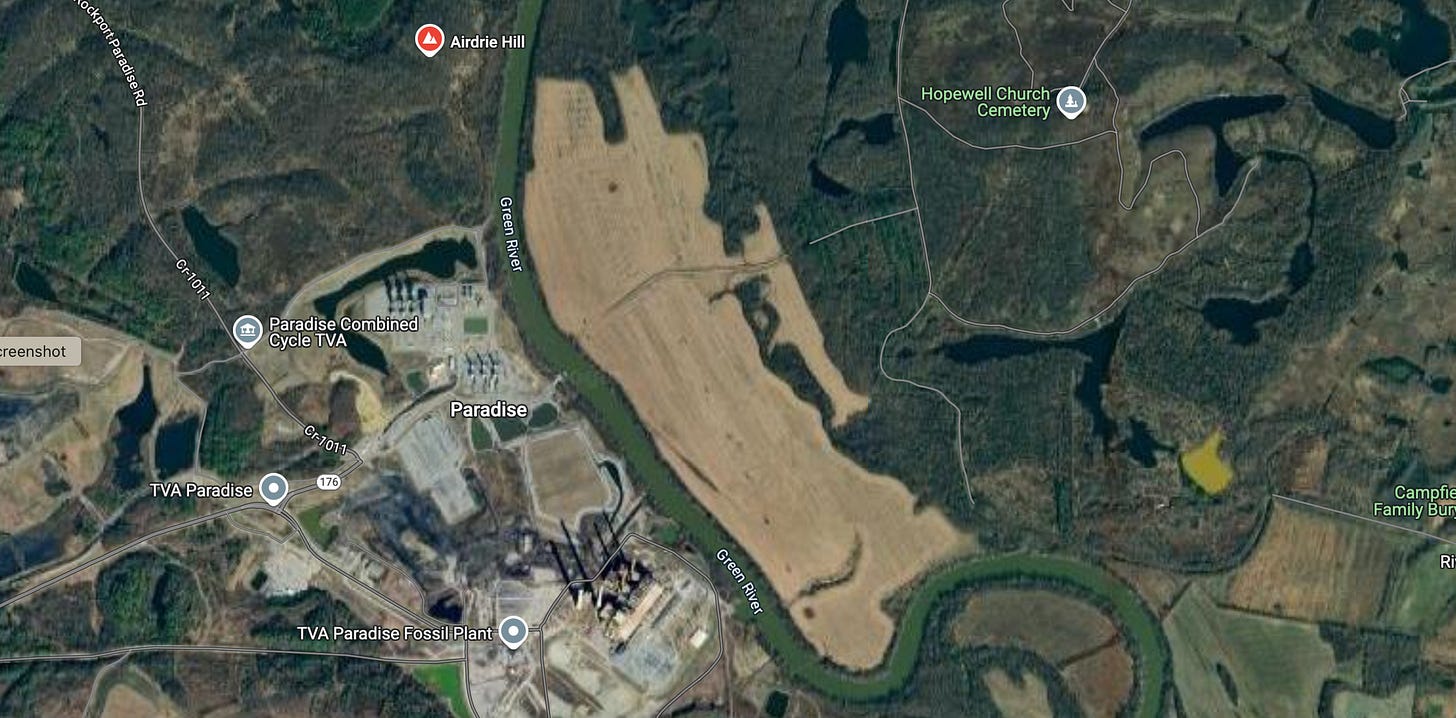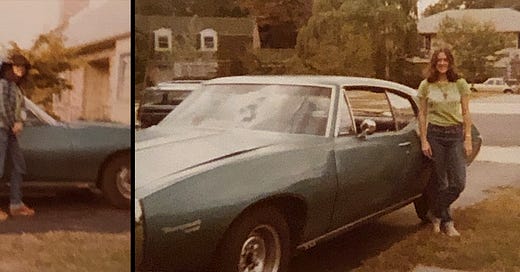Paradise Lost
"And Daddy, won't you take me back to Muhlenberg County, down by the Green River where Paradise lay?" —John Prine
John Prine’s song “Paradise” both memorializes the Kentucky town his parents were from and mourns the destruction wrought by coal mining. “Paradise” gripped my heart with a tight fist when I was a teenager and never let go. It couldn’t have been because I knew it would come back to haunt me. No, besides the sheer heartache of the song, I thought it was because my dad grew up in Kentucky, and I’d heard stories about the swimming hole near Wilmore, the paper route in Berea—a town my grandmother spoke of fondly, even passionately, as if it were paradise.
The landscape Prine sings of shares climate, ecosystems and local culture with landscapes I drove through and hiked in western Virginia, so I fancied I could imagine Paradise, even though it’s further west than Dad ever lived.
When I was a child my family would travel
Down to Western Kentucky where my parents were born
And there's a backwards old town that's often remembered
So many times that my memories are wornIn high school, I felt lucky to be around people who liked to play guitars and sing… and didn’t mind some out-of-tune warbling from the cool ‘70s teenagers sitting around them. Sitting around out on the grass at lunch. Sitting around on the floor at church youth group. Sitting around on picnic tables and grass at the park.
Some songs became regulars, played at every party, sung on every camping trip. Well I don’t give a damn about a greenback dollar, spend it fast as I can… Dear Abby Dear Abby you won’t believe this, but my stomach makes noises whenever I kiss… I’m gonna lay down my sword and shield, down by the riverside.1 “Paradise” was one of them.
We hiked and camped in the Shenandoah Mountains, the Appalachians. Explored the woods and slept in leaky tents. Crossed creeks balancing on slick logs. Peeled prickly pear cactus for snacks. Tweezed prickly pear spines from the roofs of our mouths. Dug sassafras roots for tea. You could accomplish anything, it seemed, with just a spade, a knife and a rope.

When I entered college in central Virginia, my life plan was to live in the mountains and run a general store. I’d read the Foxfire books and was rarin’ to go. In one high school class,2 my year-long project had been to set up and operate, virtually, that general store. As long as I was in college now, why not major in business? I could learn what I’d need to know to keep that store afloat.
It didn’t take me three weeks to turn away from the intensely competitive, CEO-molding business school, a turn that left my academic career rudderless. The next semester I veered around from astronomy—where I learned to see some stars as closer and others as thousands of light years further away, giving a whole new sense of dimension to the night sky—to poetry, which always felt like a cherry on top, never imagining I could do it IRL. To philosophy, and a French class, and this new thing called environmental science.
It was a spring of awe and wonder: You could actually get a college degree, and maybe even a job, by taking classes that let you walk around in the woods, getting to know them from the clouds in the sky right on down to the tectonic plates! That amazement is less surprising when you understand that at the time, there were only about 10 such programs in the whole country. I was fortunate indeed to have stumbled upon my tribe.
After graduating, I landed a summer job in Washington, D.C., working in the Department of the Interior’s Office of Surface Mining. OSM had a headquarters, where I worked, and two field offices, Denver and Pittsburgh. A misstep would get you transferred to Pittsburgh. It was the Reagan era, when James Watt headed Interior. I learned that the rectangles of unfaded paint on some of the office walls were where coworkers had taken down their Sierra Club and Audubon posters.
My job involved reviewing strip mines’ Environmental Impact Statements. When I diligently noted what looked like a few shortcomings in one, I was informed that it wasn’t our job to find problems in the EIS reports. It was our job to approve them.
The next one that came across my desk was for the Peabody Coal Company.
Well, I'm sorry, my son, but you're too late in asking.
Mister Peabody's coal train has hauled it away.I wanted to walk right out of there and never look back, but my practical side blocked the way. After freshman year, my family had moved away to California, and I was trying to make it on my own. So I stayed, with John Prine’s voice ringing in my head that whole long, queasy summer.
One day near the end of my internship, I was called upstairs to the director’s office. I don’t recall his name, but I do recall the tension whenever someone had to meet with him. The director had an officious way of speaking, like a drill sergeant in the movies. Words hit you like bullets. “Kelly,” he growled, “You’ve. Been doing. Good work. How would you like. A position. In Pittsburgh?”
Hang on, was this a compliment or a sentencing? My memory has me backing out and running down the stairs, relieved that I’d already landed a job at the Environmental Protection Agency. Barely a decade old, EPA was still the new kid on the block (a role I knew well from my military upbringing). Who cared if the position was only temporary!

Mountaintop removal is an extreme form of strip mining. Mister Peabody’s Coal Company3 can come on to your land, the place you and your people have lived for generations, and force you off. Then blast the ridge to kingdom come and dig out the coal seam underneath. You come back home to dirt. Maybe with something planted in it, for what is called remediation, and not even ironically.
My poem “Doing Violence to the Language: Mountaintop Removal”4 grapples with this unspeakable (literally: follow the link and see why I’ll never read this poem aloud) rape of the Earth we’ve been gifted.
Then the coal company came with the world's largest shovel
And they tortured the timber and stripped all the land
Well, they dug for their coal till the land was forsaken
Then they wrote it all down as the progress of manJohn Prine’s death—early in the pandemic on April 7, 2020—hit me hard. Thank God his music lives on.
When I die, let my ashes float down the Green River
Let my soul roll on up to the Rochester Dam
I'll be halfway to Heaven with Paradise waitin'
Just five miles away from wherever I amAccording to Beech Tree News, Prine’s family did scatter his ashes on the Green River above Rochester Dam. And Muhlenberg County established John Prine Memorial Park along the river just below the dam. Clearly, I’m not the only person his song won’t let go of.

“Greenback Dollar,” by Hoyt Wayne Axton and Ken Ramsey; “Dear Abby,” by John Prine; “Down by the Riverside /Ain't Gonna Study War No More,” African American spiritual.
Distributive Education, which allowed us a shorter school day so we could go work at our part-time jobs.
Actually, in 2007 Peabody Coal Company (now Peabody Energy), spun off its West Virginia and Kentucky operations to the strategically named Patriot Coal Co.
With gratitude to Poetry Daily for picking it up, out of the very last issue of the late great journal Hubbub.




